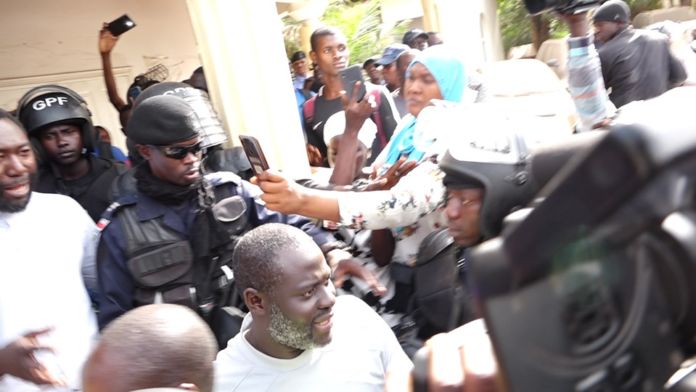By Adama Makasuba
Magistrate Pierrette Mendy Sarr of Kanifing Magistrates’ Court on Wednesday transferred a trial case involving executive of Operation Three Years Jotna to High Court Special Criminal Division after announcing not having the jurisdiction to hear the case.
The accused of Abdou Njie, Yankuba Darboe, Ebrima Kitim Jarju, Sheriffo Sonko, Fanta Mballow, Kassim Touray, Haji Suwaneh, and Muctarr Ceesay are charged with unlawful assembly, contrary to section 70 of the criminal code, cap 10:o1 Vol III laws of The Gambia 2009, rioting after proclamation contrary to section 74 of the criminal code, cap 10:01 Vol III laws of The Gambia 2009, rioters demolishing structures, contrary to section 76 of the criminal code cap 10:01 Vol III laws of The Gambia .
In his submission prosecuting officer M.D. Mballow submitted that counts 1 and 2 attract an imprisonment of 1 and 5 years respectively while count 3 attracts life imprisonment.
“Our laws do not confer this court with the power to try offences that attract life imprisonment,” he said, relying on Legal Notice number 3 of 2009 which provided for a Special Criminal Division of the High Court to try offences such as count 3 because it attracts the sentence of life imprisonment. Mballow argued that the legal notice forms part of the laws of the Gambia in reliant to section 7 of the Constitution.
“Legal Notice number 3 of 2009 takes away the jurisdiction of this honourable court to try count 3 (rioters demolishing structures),” Mballow said.
He said since the legal notice oust the court’s power to try the offence it should transfer the matter to the high court and remand the accused persons pending their arraignment before the high court.
However, in his counter, defense Lawyer Lamin S Camara said: “This court has the jurisdiction to try this case. This court has all the powers under section 5 (2) of the Criminal Procedure Code (CPC) (powers of the subordinate courts).”
“Sentence to life imprisonment is not mandatory under our laws, unlike treason which attract death. The court can reduce sentences including life imprisonment sentences,” he said.
Mballow in his reply on points of law said section 5 of the CPC provides that the court shall not derogate from the law that confers jurisdiction to another court.
He said Legal Notice number 3 of 2009 is a law envisaged and recognised by section 7 of the Constitution. He said section 27 of the CC deals with punishment and it has no bearing in the argument.
“This court cannot deal with an offence that it does not have jurisdiction to try. capital offence does not exclude offences that attract life imprisonment. Capital offence includes life imprisonment.”




